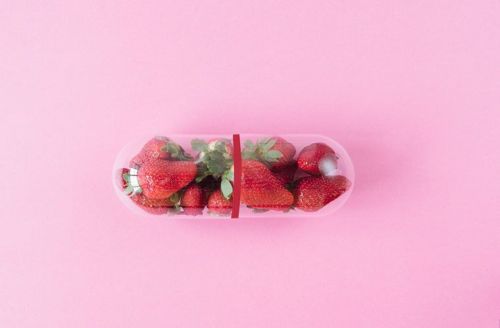Our editors independently select these products. Making a purchase through our links may earn Well+Good a commission
In an ideal world, everyone would get all their daily needed nutrients through food. But as any physician will tell you, it just isn’t happening. More than a whopping 170 million Americans pop a supplement daily, and the industry is valued at $32 billion. But have you ever stopped to wonder what exactly your eating habits would look like if you put down your capsules and tried to get everything you needed from food alone?
To find out, I tapped two experts on the subject: Monica Ruffo began her supplement education shortly after she was diagnosed with breast cancer. Determined to find capsules that were void of synthetics, fillers, or isolates, she sought out the help of her local pharmacist. He couldn’t find a single brand that lived up to what she wanted. Frustrated, she spent the following years doing her own research and founding her newly launched brand, Well Told Health. All the ingredients in her supplement line are made from organic food—and tested to ensure they’re truly clean. In the process of developing her apothecary, she learned a lot about food and supplements.
“Diet and lifestyle vary greatly from person to person, which is why it’s important to get your blood levels checked with a physician to see exactly what you’re deficient in.”
Also lending her expertise is Dr. Svetlana Kogan, MD, a holistic and integrative physician and author unaffiliated with any brands. Experienced in Ayurvedic healing, herbology, and energy treatment, she treats with food first and recommends supplements after, to fill in the gaps.
One caveat to all the great advice they offer below: There’s no set of one-size-fits-all guidelines. “Diet and lifestyle vary greatly from person to person, which is why it’s important to get your blood levels checked with a physician to see exactly what you’re deficient in,” Dr. Kogan says.
Rounded up here are the seven most popular supplements—excluding the best-selling category, multivitamins—and how much food you’d have to consume to get exactly what your body needs.
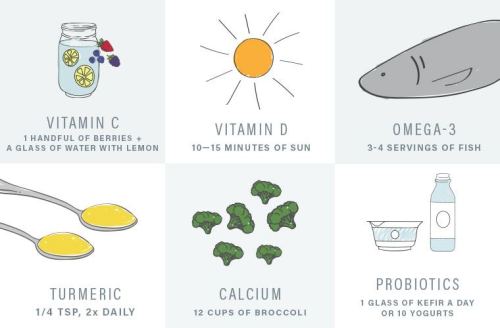
How much food does it take to get all your needed nutrients every day? Keep reading to find out.
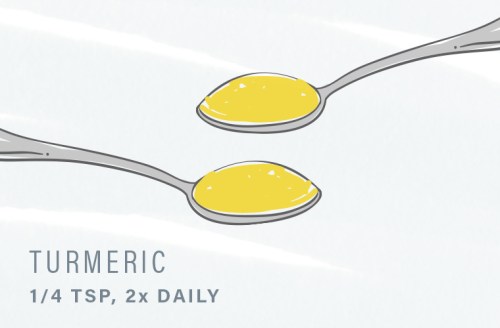
Turmeric
Excluding multivitamins, turmeric is the top selling supplement in the U.S. “To use turmeric medicinally, you need 500 to 1,000 milligrams a day, and 500 milligrams is about a quarter of a teaspoon,” Ruffo says. “If you like the taste of it, just add that much to your lunch and dinner and you actually don’t need a supplement.”

Probiotics
Keeping your gut populated with good bacteria not only keeps your digestion in check but is also linked to boosting your mood, which makes probiotics literal happy pills. So how can you reap the benefits through food alone? “One 8-ounce glass of organic kefir has what you need,” says Dr. Kogan, adding that it also has different strains, which is a bonus. But if you’re relying on yogurt for your daily dose, she has some bad news: You’d need to down 10 a day for it to add up. And, chances are, you’d get too much dairy and sugar if you do it.
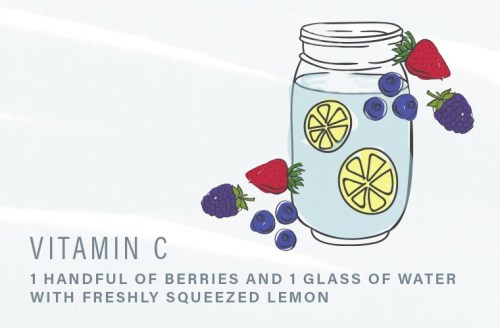
Vitamin C
“Most people today get more than enough vitamin C from food,” Ruffo says. But if you’re starting to feel run-down—or want to prevent seasonal colds—Dr. Kogan says an extra dose could do you good. And no, a supplement isn’t the only way to get it. “One handful of blueberries, blackberries, or strawberries is packed with vitamin C,” she says. Another food-based vitamin C hack is drinking a glass of water with freshly squeezed lemon juice.
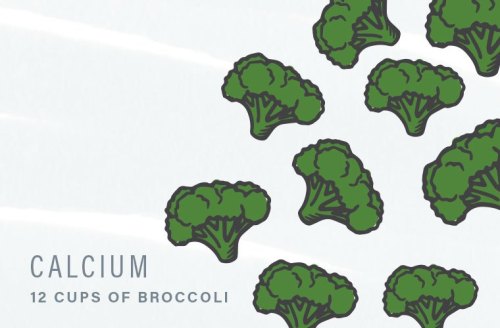
Calcium
If you grew up in the era of Got Milk? commercials, you might think dairy is the best way to get your calcium—and if you’re living a DF-life, that means you absolutely need a supplement. Turns out, that’s not necessarily true. “Ironically, research has shown that populations that consume a lot of dairy actually have the highest rate of osteoporosis,” Ruffo says.
In reality, vegetables—like dark leafy greens—are a better source, but you’ll need to eat a lot of them to get everything you need—12 cups of broccoli to be exact. Like kale more? You’ll need five cups a day to get what’s in a capsule.
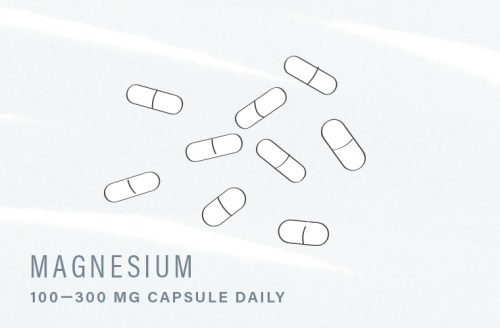
Magnesium
According to both experts, chances are you’re low in magnesium—and no food will be enough to help. “Magnesium is a trace mineral and traditionally, you used to be able to get enough through plants, but our soil has become so depleted that you really can’t anymore,” Ruffo says.
Dr. Kogan says that the recommended dose is between 100 and 300 milligrams daily and not getting enough can lead to a wide range of health probs. If you suffer from migraines, insomnia, high-blood pressure, or IBS, she says a supplement can make a noticeable difference.
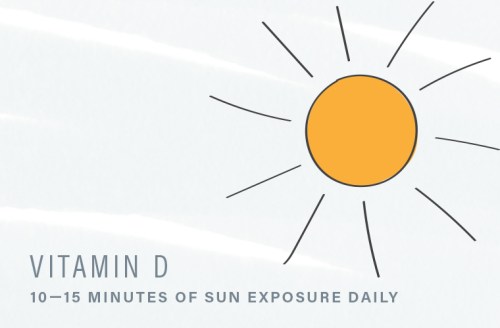
Vitamin D
Dr. Kogan says she sees so many patients deficient in vitamin D that she calls it an epidemic. “Out of 100 patients, I’d say 80 are significantly deficient,” she says. Not getting enough is linked to a long list of health issues, from annoyances like bloating to more series diagnoses such as breast cancer.
“It’s actually not a vitamin, it’s a hormone,” Ruffo says. “It’s something the body makes in reaction to the sun.” Considering that most people spend the bulk of their time indoors, not very many people get enough. “You would need 10 to 15 minutes of sun exposure every day with the right amount of UV. And if you live in the northern part of the country and it’s winter, the sun isn’t going to be powerful enough,” she says.
When Ruffo was looking into creating a vitamin D supplement, she learned almost every capsule out there was sourced from sheep skin oil. In other words, you’re getting the hormones from the sheep. But she worked with researchers who found a way to use portobello mushrooms instead. “They point the gils to the sun, which creates vitamin D. It’s pretty crazy someone thought to do that,” she says.
While Dr. Kogan says dairy does have some vitamin D, she recommends a supplement of between 500 and 1000 IUs to almost everyone, though she says some people need as much as 5,000 IUs, which is why it’s important to get a blood test before starting on a regimen.

Omega-3
Fish oil supplements are a big business, but it turns out it’s pretty easy to get the recommended 200 to 500 milligrams a day. If you eat fish, Dr. Kogan says three to four servings of low-mercury fish (like sardines or salmon) is enough, and she strongly recommends it over supplements. “You can’t control the amount of mercury contamination in a capsule because [unlike food], supplements are completely unregulated,” she says.
If you don’t eat meat, Ruffo offers up her own solution: one tablespoon of flaxseed or flaxseed oil a day.
If, after consulting with your doc, you decide you should round out your next grocery shopping trip with a tour of the vitamin aisle, make sure you choose ones that actually test their ingredients and aren’t mostly fillers. The only thing you want to be filling up on is nutrients.
Speaking of supplements, here’s how to know if you are taking too many. Plus, these are the best ones for strong nails.
Sign Up for Our Daily Newsletter
Get all the latest in wellness, trends, food, fitness, beauty, and more delivered right to your inbox.
Got it, you've been added to our email list.
